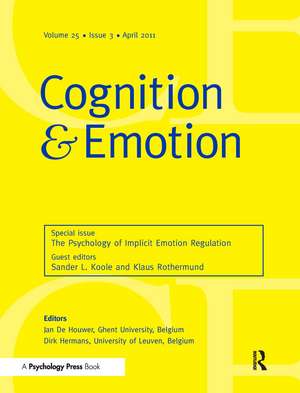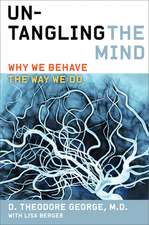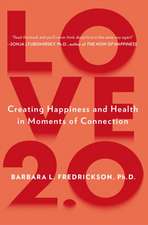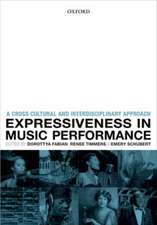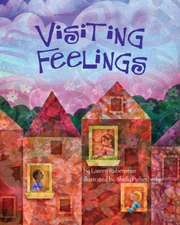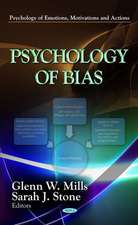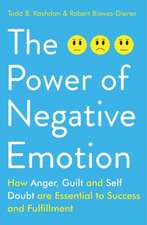The Psychology of Implicit Emotion Regulation: A Special Issue of Cognition and Emotion: Special Issues of Cognition and Emotion
Editat de Sander L. Koole, Klaus Rothermunden Limba Engleză Paperback – 6 mai 2011
This special issue showcases recent advances in theorizing and empirical research on implicit emotion regulation. Implicit emotion regulation is pervasive in everyday life and contributes considerably to the effectiveness of emotion regulation. The contributions to this special issue highlight the significance of implicit emotion regulation in psychological adaptation, goal-directed behavior, interpersonal behavior, personality functioning, and mental health.
Preț: 384.86 lei
Nou
Puncte Express: 577
Preț estimativ în valută:
73.64€ • 76.89$ • 60.95£
73.64€ • 76.89$ • 60.95£
Carte tipărită la comandă
Livrare economică 05-19 aprilie
Preluare comenzi: 021 569.72.76
Specificații
ISBN-13: 9781848727373
ISBN-10: 1848727372
Pagini: 184
Dimensiuni: 189 x 246 x 13 mm
Greutate: 0.34 kg
Ediția:1
Editura: Taylor & Francis
Colecția Psychology Press
Seria Special Issues of Cognition and Emotion
Locul publicării:Oxford, United Kingdom
ISBN-10: 1848727372
Pagini: 184
Dimensiuni: 189 x 246 x 13 mm
Greutate: 0.34 kg
Ediția:1
Editura: Taylor & Francis
Colecția Psychology Press
Seria Special Issues of Cognition and Emotion
Locul publicării:Oxford, United Kingdom
Cuprins
S.L. Koole, K. Rothermund, Editorial: "I Feel Better but I Don't Know Why": The Psychology of Implicit Emotion Regulation. A. Gyurak, J.J. Gross, A. Etkin, Explicit and Implicit Emotion Regulation: A Dual-Process Framework. K. Rothermund, A. Gast, D. Wentura, Incongruency Effects in Affective Processing: Automatic Motivational Counter-Regulation or Mismatch-Induced Salience? P. Freytag, M. Bluemke, K. Fiedler, An Adaptive-Learning Approach to Affective Regulation: Strategic Influences on Evaluative Priming. S.L. Koole, D.A. Fockenberg, Implicit Emotion Regulation under Demanding Conditions: The Moderating Role of Action versus State Orientation. S.G. Moore, M.J. Ferguson, T.L. Chartrand, Affect in the Aftermath: How Goal Pursuit Influences Implicit Evaluations. J. Vogt, L. Lozo, E.H. W. Koster, J. De Houwer, On the Role of Goal Relevance in Emotional Attention: Disgust Evokes Early Attention to Cleanliness. A. Eder, Control of Impulsive Emotional Behavior through Implementation Intentions. M.L. Meyer, E.T. Berkman, J.C. Karremans, M.D. Lieberman, Incidental Regulation of Attraction: The Neural Basis of the Derogation of Attractive Alternatives in Romantic Relationships. N.B. Jostmann, J.C. Karremans, C. Finkenauer, When Love is Not Blind: Rumination Impairs Implicit Affect Regulation in Response to Romantic Relationship Threat. M.B. Mikulincer, P.R. Shaver, The Effects of Implicit and Explicit Security Priming on Creative Problem Solving. H. Hopp, A.S. Troy, I.B. Mauss, The Unconscious Pursuit of Emotion Regulation: Implications for Psychological Health. T.B. Tran, M. Siemer, J. Joormann, Implicit Interpretation Biases Affect Emotional Vulnerability: A Training Study. M. Quirin, R.C. Bode, J. Kuhl, Recovering from Negative Events by Boosting Implicit Positive Affect.
Notă biografică
Sander L Koole, Klaus Rothermund
Descriere
Emotion regulation has traditionally been conceived as a deliberative process, but there is growing evidence that many emotion-regulation processes operate at implicit levels. Implicit emotion regulation is initiated automatically, without conscious intention, and aims at modifying the quality of emotional responding.
This special issue showcases recent advances in theorizing and empirical research on implicit emotion regulation. Implicit emotion regulation is pervasive in everyday life and contributes considerably to the effectiveness of emotion regulation. The contributions to this special issue highlight the significance of implicit emotion regulation in psychological adaptation, goal-directed behavior, interpersonal behavior, personality functioning, and mental health.
This special issue showcases recent advances in theorizing and empirical research on implicit emotion regulation. Implicit emotion regulation is pervasive in everyday life and contributes considerably to the effectiveness of emotion regulation. The contributions to this special issue highlight the significance of implicit emotion regulation in psychological adaptation, goal-directed behavior, interpersonal behavior, personality functioning, and mental health.
